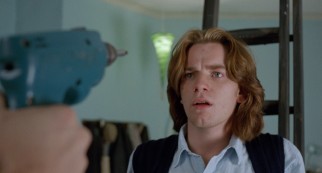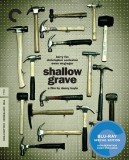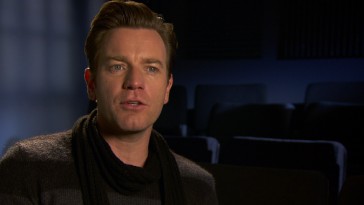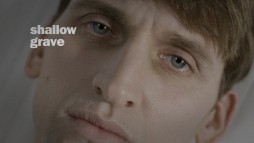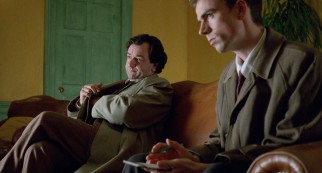Shallow Grave: The Criterion Collection Blu-ray Review
 |
Shallow Grave
UK Theatrical Release: January 6, 1995 / Running Time: 93 Minutes / Rating: R Director: Danny Boyle / Writer: John Hodge / Songs List Cast: Kerry Fox (Juliet Miller), Christopher Eccleston (David Stephens), Ewan McGregor (Alex Law), Ken Stott (Detective Inspector McCall), Keith Allen (Hugo Lewis), Colin McCredie (Cameron), Victoria Nairn (Woman Visitor), Gary Lewis (Male Visitor), Jean Marie Coffey (Goth), Peter Mullan (Andy Gallacher), Leonard O'Malley (Tim O'Hara), Robert David MacDonald (Lumsden), Tony Curren (Travel Agent George Gannier), John Hodge (Detective Constable Mitchell) |
Buy Shallow Grave from Amazon.com: Criterion Collection Blu-ray • Criterion Collection DVD
The list of esteemed filmmakers who have never won an Academy Award for Best Director is extremely long and includes such luminaries as Alfred Hitchcock and Stanley Kubrick. Many of those fortunate enough to receive the honor had to wait a long time for their recognition: Steven Spielberg won nineteen years into his theatrical career, Boyle's career began in his native United Kingdom with the Scottish thriller Shallow Grave. This film was given a narrow theatrical release in the United States, opening in just six theaters in February of 1995 en route to a modest $2 million pull. Back home, though, it won the BAFTA for Best British film, announcing the arrival of a trio of new talents. Boyle made his debut alongside fellow first-timers, writer John Hodge and producer Andrew Macdonald, both of Glasgow. The trio would make a formidable team, collaborating on three additional features and a shelved 30-minute short film (intended for an anthology that never materialized) over the next several years, most notably the acclaimed Trainspotting.
Shallow Grave displays the enthusiasm of a first film but the confidence of a seasoned director, which in a way Boyle was, having helmed five telemovies and eight TV episodes dating back to the 1980s.
This tells the story of three young flatmates sharing a spacious penthouse apartment in the Scottish capital Edinburgh. Mild-mannered accountant David (Christopher Eccleston, the ninth Doctor Who), channel-surfing journalist Alex (Ewan McGregor), and phone call-dodging doctor Juliet (Kerry Fox) are looking for a fourth person with whom to share their quarters and their rent. They screen potential applicants in a brutal fashion, hitting them with a barrage of unsettling questions and declining them for the least significant of reasons. The process seems to be one big joke to the three friends.
While it hardly seems pressing, they soon find a roommate they can agree on in an author named Hugo (Keith Allen, father of singer Lily). Shortly after moving in, though, Hugo is found dead in his bed. His roommates are about to alert the police until among his possessions they find a suitcase full of money, enough to provide financial security for years to come. Tempted by the discovery and weary of authorities seizing the loot, the friends decide not to report Hugo's death. After a few days, they decide they must dispose of the body and in a way that cannot connect them to the death in any way. Reluctantly, they do just that, performing some grisly dismemberment with newly-acquired hardware.
David, Alex, and Juliet hide their unauthorized inheritance in the attic and grow increasingly guilty and paranoid. David takes to living in the attic, defending the suitcase with lock and key. All three are consumed by their crime and fearful of the consequences, which with hardened criminals on their trail, are very real.
With Shallow Grave, Boyle, Hodge, and Macdonald make a solid entrance into the world of cinema. The film is sharply written; darkly comedic, at times and reasonably riveting at others. The three leads are more than up to the acting challenges, which are quite modest. McGregor shows the most star potential, status he soon achieved and impressively continues to hold onto in America, long after severing ties with Boyle over his casting of 2000's The Beach. In addition to keeping you on edge with the possibility of either criminal or police retribution, the film holds you captive with the real and frightening possibility that one of the three friends will crack and either emerge with a confession or a getaway. It's ground well-tread dramatically but still fertile enough with a design that keeps you guessing and revising your stance on the best course of action.
Shallow Grave remains one of Boyle's least-known works, having received fewer user votes than all but two of the director's subsequent films (A Life Less Ordinary and the very good Millions). It should, however, get a boost in recognition beginning tomorrow when it becomes Boyle's first movie admitted into The Criterion Collection. Shallow claims spine number 616 with a single disc on DVD and Blu-ray, the latter of which we review here.
VIDEO and AUDIO The opening titles of Shallow Grave are less than spotless, but beyond them, the Blu-ray's 1.85:1 transfer looks quite great, possessing the clarity of a brand new movie but the fine grain of a low-budget '90s European flick. The 2.0 surround DTS-HD master audio is adequately crisp and lively, though not extremely remarkable.
BONUS FEATURES, MENUS, PACKAGING and DESIGN The disc's extras begin with two audio commentaries. The first, recorded in 2009, features director Danny Boyle alone. He reflects upon how to make a film for one million pounds, the unique combination of doctors/writers such as John Hodge, his influences (Goodfellas), and the film's casting (the two future "masters of the universe" were the harder sell, but art house star Kerry Fox earned the production a guaranteed release). The second commentary, a 2012 Criterion one, features writer John Hodge and producer Andrew Macdonald. They don't speak as frequently or as interestingly and repeat some of the same details as Boyle. Some interesting remarks still emerge from their discussion of making and selling the film, such as how Macdonald was sued for the use of "Lose a Million" game show footage. On the all-HD video front, things begin with "Interviews" (28:55), a 2012 Criterion piece that catches up with the three stars of Shallow Grave, Ewan McGregor, Kerry Fox, and Christopher Eccleston. Their recollections of the film are warm and vivid. "Video Diary" (8:58) is a fascinating short that producer Andrew Macdonald and his brother Kevin put together at the 1992 Edinburgh Film Festival, as they seek to get Shallow Grave made. They speak with filmmakers, critics, and actors (including Robbie Coltrane and Christopher Lambert), eventually managing to get Sean Connery on the phone on his birthday while sitting in his trailer on the Los Angeles set of Rising Sun. I suspect that this is slightly tongue in cheek, but it's very interesting all the same.
"Digging Your Own Grave" (29:48) also hails from Kevin Macdonald. This solid making-of documentary, which aired on BBC, starts at the '92 Edinburgh Film Festival and gives us plenty of candid behind-the-scenes footage with the cast and crew, from construction of the set to sorting out finances to filming itself and trying to keep the production on schedule to premiering the film at Cannes. Shallow Grave's theatrical trailer (2:05) is included, and though I suspect Finally, a teaser (1:14) for the next Boyle/Hodge/Macdonald production, Trainspotting, is included, as it was on Shallow Grave's original home video release. It is unique footage, as Ewan McGregor addresses audiences in character. A booklet, thin for Criterion and massive by every other studio's standards, folds open to eight pages. Half of those go to artwork, transfer information, film credits, and disc acknowledgements. The reverse side's remaining four pages present "A Film Called Cruel", a fine essay by English film professor/critic Philip Kemp that puts Shallow in the context of British cinema and aptly likens it to the Coen Brothers' first movie Blood Simple., Boyle's own Millions, and other works from Hitchcock to Billy Wilder. The DVD-thick, Blu-ray-height clear keepcase displays chapter titles on the reverse side of its artwork. The menu's scored montage only features creepy imagery. The disc supports bookmarks and also resumes playback after your player powers down.
CLOSING THOUGHTS Shallow Grave doesn't stand up perfectly to scrutiny, but this fairly gripping thriller makes for a strong debut from one of the most compelling directors of our time. Criterion's Blu-ray serves up a fine feature presentation and a satisfying collection of supplements. Check it out! Support this site when you buy Shallow Grave now from Amazon.com: Blu-ray / DVD
|
Related Reviews:
DVDizzy.com | DVD and Blu-ray Reviews | New and Upcoming DVD & Blu-ray Schedule | Upcoming Cover Art | Search This Site
Directed by Danny Boyle: 127 Hours • Sunshine | Produced by Danny Boyle: 28 Weeks Later
New: New York Stories • Whisper of the Heart • Ghost Rider: Spirit of Vengeance
1990s: Four Weddings and a Funeral • Dazed and Confused • The Firm • Rushmore • The Thin Red Line
Ewan McGregor: The Men Who Stare at Goats • I Love You Phillip Morris • Angels & Demons • Amelia • Valiant
Directors' First Movies: Being John Malkovich • Blood Simple. • Bottle Rocket • The Guard
Shallow Grave Songs List (in order of use): Leftfield - "Shallow Grave", Nina Simone - "My Baby Just Cares for Me", Andy Williams - "Happy Heart", Leftfield - "Release the Dub"


